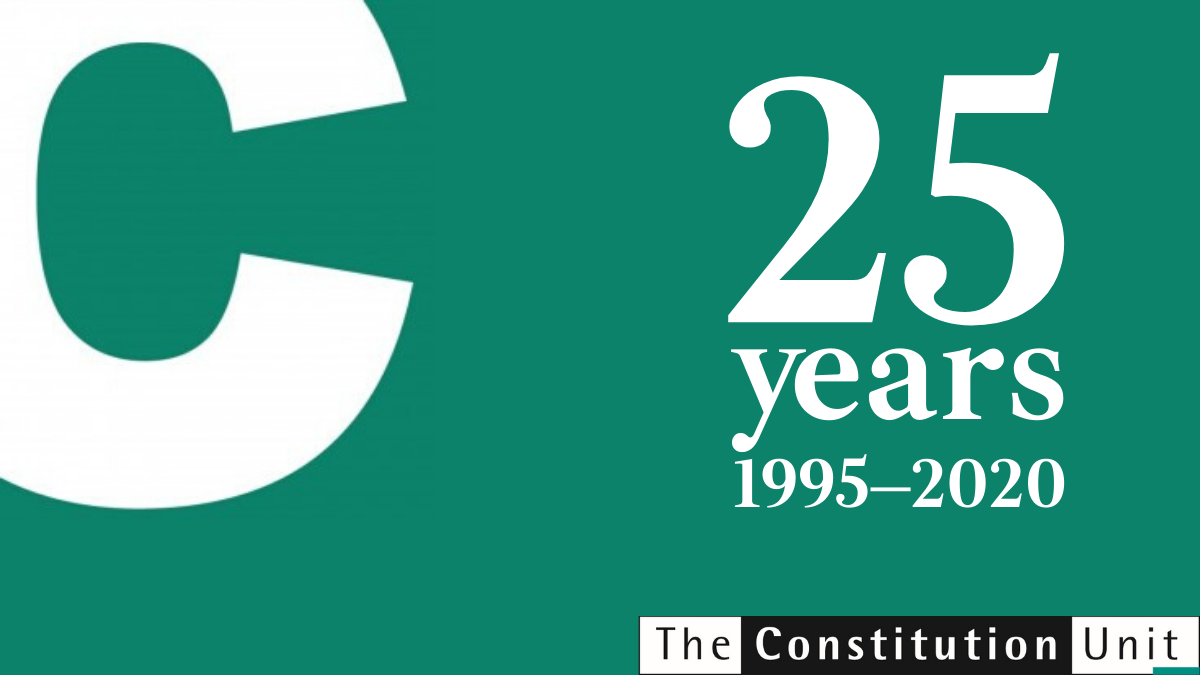
The Constitution Unit is 25!
This year, 2020, marks a full 25 years since the Unit was founded! It has been a hugely eventful period, both in terms of real-world constitutional change and controversies, and in terms of the Unit's own work. To mark our silver anniversary, we are celebrating some of the key ways in which the Unit has contributed to public debates, and helped to inform policy change, over this period. What better way to celebrate 25 years than with 25 of our most notable achievements.
1. Hitting the ground running
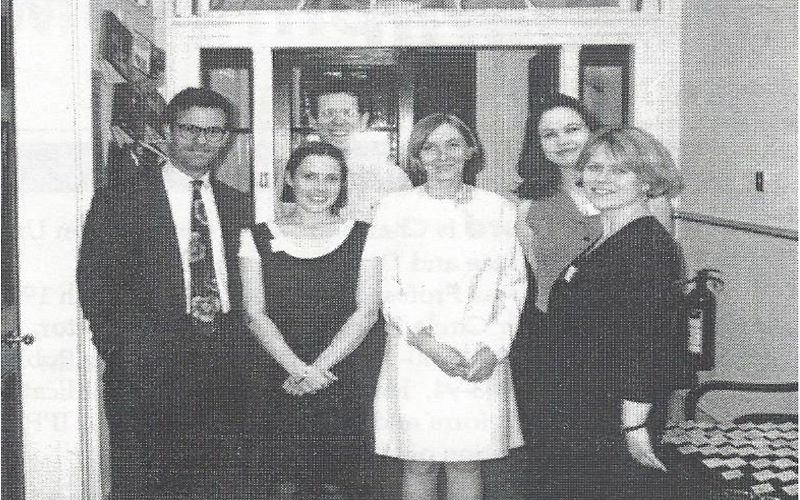
Robert Hazell founded the Constitution Unit in 1995, with funding from six charitable trusts, to help with detailed planning for big constitutional reforms following a possible change in government. The initial research team included Graham Leicester (from the Foreign Office), Nicole Smith (Home Office) and Katy Donnelly. The Unit published seven book-length reports the following year: the first on how to prepare and deliver a big constitutional reform programme, and others on devolution to Scotland, Wales and the English regions, reform of the House of Lords, human rights legislation, and the conduct of referendums (the latter recommending the establishment of an Electoral Commission). From 1997, the new Labour government began to implement its constitutional reform programme, which often reflected Unit recommendations. Responding to the intense reform activity in the government, the Unit published 17 further reports in 1998 and 20 more in 1999.
2. Monitor goes to print
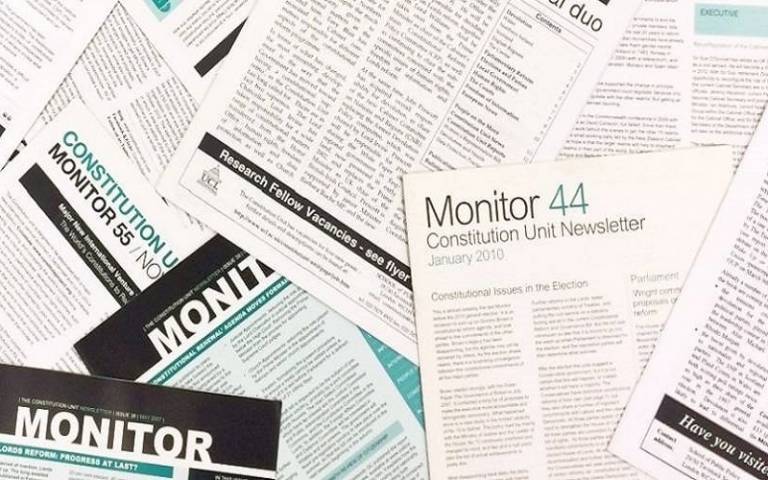
In September 1997 the Unit published the first issue of Monitor, its regular bulletin of constitutional news. Monitor continues today to provide an essential digest of political and constitutional changes three times a year, valued by over 4800 subscribers – if you are not among them, you can sign up here.
3. Reform of the House of Lords
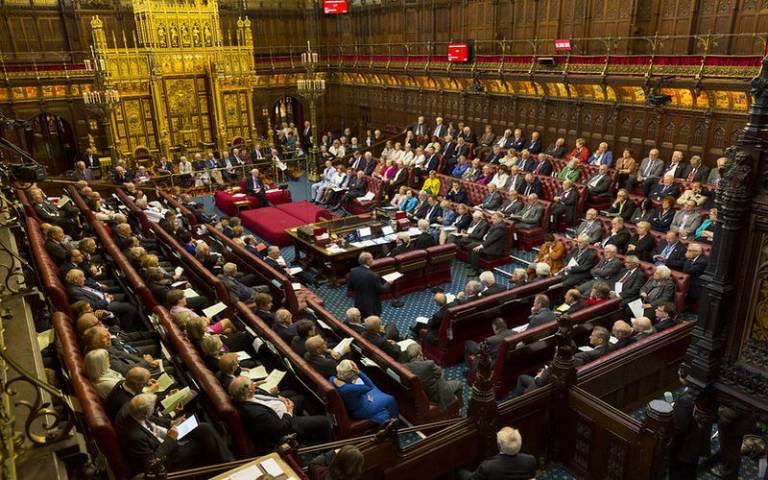
From its earliest years, the Unit has fed in regularly to debates about reform of the House of Lords. It published ten briefings for the Royal Commission on the Reform of the House of Lords in 1999, several of them authored by the Unit’s future Director Meg Russell and drawing on analysis of overseas experience. In 2000, she published the book Reforming the House of Lords: Lessons from Overseas. This body of comparative research has influenced debates on second chamber reform in various other countries as well as the UK – including Canada, Italy and Japan. Meanwhile Meg’s 2013 book The Contemporary House of Lords is today’s definitive work on the chamber, underpinned by research funded by the ESRC.
4. Mapping the future of our constitution
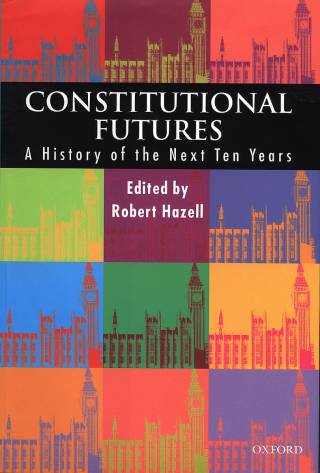
In 1999, Robert Hazell coordinated a team to publish Constitutional Futures, arguing that constitutional reform would be a dynamic process, with the first big wave of reforms giving rise to further waves - which proved in many respects to be correct. In 2008 Robert brought together a new team of authors to produce Constitutional Futures Revisited.
5. Leading the way in research on devolution
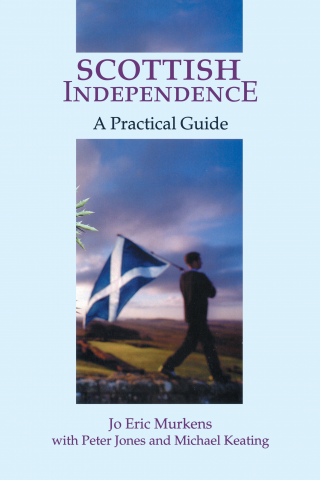
The Unit’s work has often been key to debates on devolution and territorial politics. Its initial reports were influential on the design of the 1997 referendums in Scotland and Wales. In 1999 Robert Hazell won a £1m grant from the Leverhulme Trust for a five-year research programme on the dynamics of devolution, involving 12 projects with 25 partners. Subsequently, as ever looking ahead to possible constitutional changes that few had thought through, the 2002 book Scottish Independence: a Practical Guide, by then Unit researcher Jo Murkens, with Peter Jones and Michael Keating, asked a series of questions about the path to independence. It was not until 12 years later that the Scottish independence referendum was held. Most recently, the Unit published Options for an English Parliament in 2018.
6. Welcoming key constitutional figures
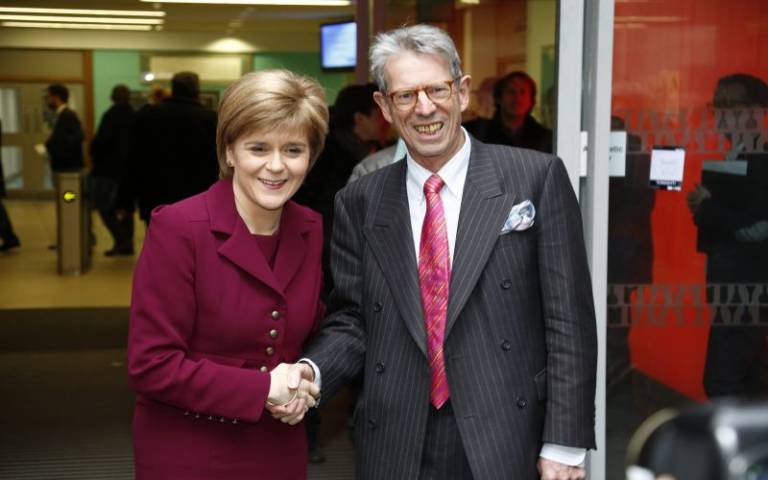
Jack Straw gave the Unit’s first keynote lecture, in 1999. Other prominent speakers at Unit events over the years have included Lord Bingham, Robin Cook, Ruth Davidson, Peter Hain, Leanne Wood, Hilary Benn, Nicky Morgan, Dominic Grieve, Bernard Jenkin, Derry Irvine, Frances D'Souza and Nicola Sturgeon. Unit seminars continue to shed crucial light on contemporary constitutional questions, and our first webinar was held in early June. Sign up here to receive notifications of future events.
7. Improving women's representation in politics
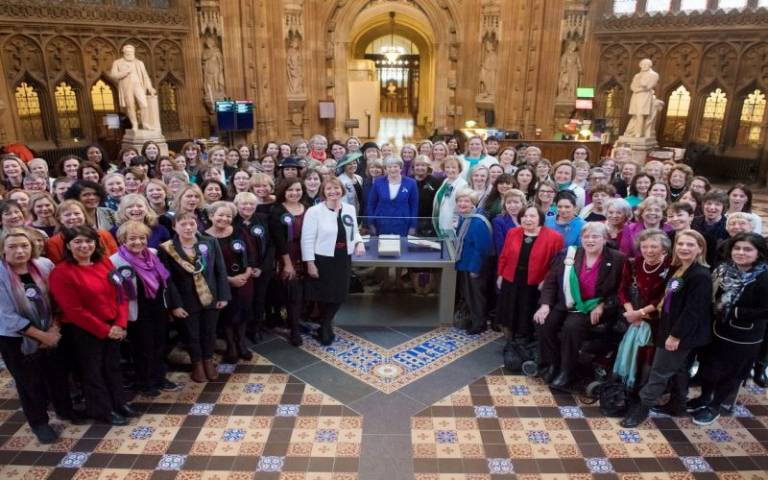
Meg Russell’s report, Women’s Representation in UK Politics: What can be done within the Law? (2000), funded by the Nuffield Foundation, explored the legal challenges following the collapse of the Labour Party’s policy of all women shortlists following a court case in 1996. The report advised, contrary to some commentators, that the UK government could safely amend the law to allow for political gender quotas without falling foul of EU law. Informed by this research, the government legislated in 2002, and women now make up more than 50% of Labour MPs.
8. Unit prizewinners in political science
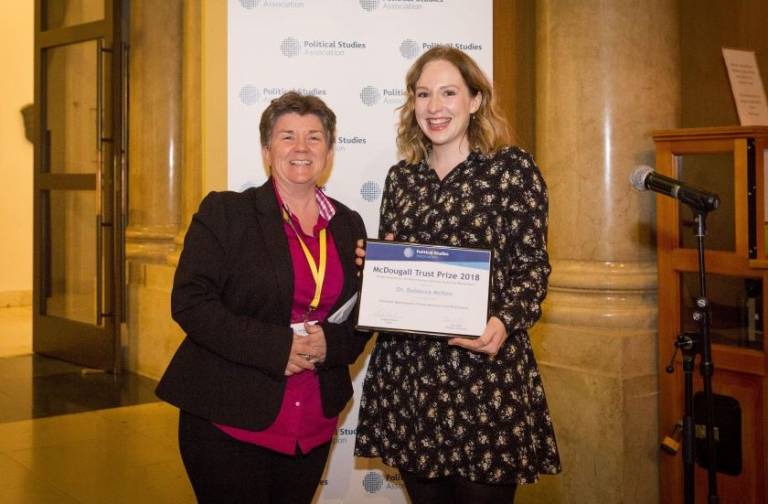
In 2009, then Constitution Unit Director Robert Hazell was awarded the ‘Political Communicator of the Year’ award by the Political Studies Association. Already in 2006, Meg Russell had won the PSA’s Richard Rose Prize, awarded annually to a younger scholar who has made a distinctive contribution to the study of British politics. In 2016, Alan Renwick was joint recipient of the PSA’s ‘Democratic Innovation’ Award, for the Democracy Matters programme of citizens’ assemblies in Sheffield and Southampton. In 2018, British Academy Research Fellow, Dr Rebecca McKee (pictured), was awarded the Arthur McDougall Fund prize for elections, electoral systems and representation for her PhD thesis “Substantive Representation of Ethnic Minorities in the UK Parliament”.
9. Making minority government work
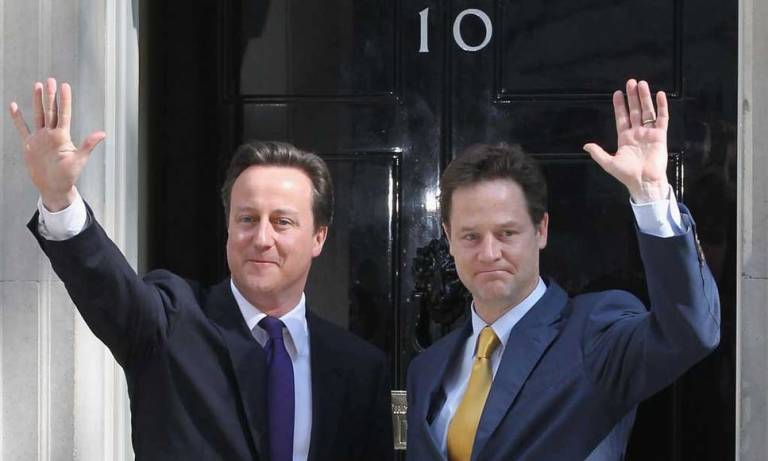
Robert Hazell’s report, Making Minority Government Work, published in 2009 jointly with the Institute for Government and written with Mark Chalmers, Catherine Haddon, Akash Paun and Ben Yong, correctly predicted the hung parliament of 2010 and set out proposals for how Whitehall should respond. Among the recommendations was a proposal to create a Cabinet Manual, on the New Zealand model. The government went on to produce a Cabinet Manual the following year, with Ben Yong seconded to the Ministry of Justice to help with drafting.
10. Influencing reform in the House of Commons
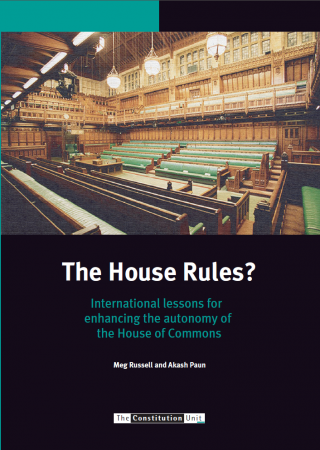
In the midst of the MPs’ expenses crisis in 2009, Prime Minister Gordon Brown announced the establishment of a Select Committee on the Reform of the House of Commons (known as the ‘Wright committee’, chaired by Tony Wright). Meg Russell became the specialist adviser to the committee, and one of its key recommendations – the creation of a Backbench Business Committee (implemented in 2010) – was very strongly influenced by recommendations from the Unit report The House Rules? that she and Akash Paun had written in 2007.
11. “A semi-official guardian of constitutional good sense”
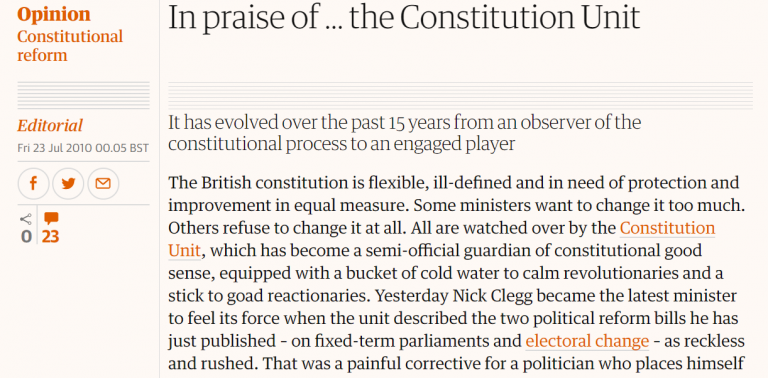
In July 2010 The Guardian dedicated its regular ‘in praise of…’ editorial to the Constitution Unit, commenting that the Unit had ‘become a semi-official guardian of constitutional good sense, equipped with a bucket of cold water to calm revolutionaries and a stick to goad reactionaries’. It particularly praised the Unit’s impact on two of the biggest political developments of the day: ‘It helped steer parliament through the dark times of the expenses scandal, setting out the case for a more powerful and honest Commons. Its report last year on minority parliaments shaped the Cabinet Secretary’s thinking, and so helped lead to this spring’s unexpectedly smooth transition to the coalition.’
12. Resizing the Lords
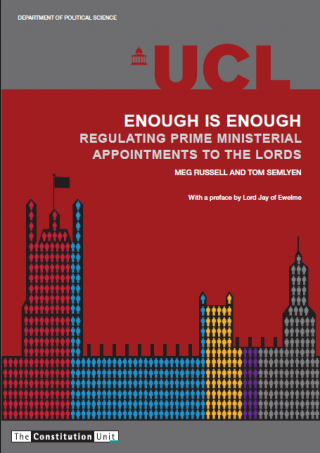
The Unit has long been concerned about the size and party balance in the House of Lords, with its first report on the topic, Rebalancing the Lords: The Numbers, written by Ben Seyd in 1998. The Unit’s report House Full, published in 2011, was the first serious analysis of the problem of growing numbers in the post-1999 House of Lords (by then standing at 792, up from 666). It was coordinated by Meg Russell, with official support from numerous senior figures, including former Commons Speaker Baroness Boothroyd, former Cabinet Secretary Lord Butler and soon-to-be Lord Speaker Baroness D’Souza. The report was discussed in the Lords, and even got a mention on Radio 4’s News Quiz. The issue didn’t go away, and the pressure was kept up by a 2015 Unit report Enough is Enough. In 2016 the Lord Speaker’s Committee on the Size of the House was established, with Meg as a specialist adviser. Its report was published in 2017.
13. Reassessing judicial independence
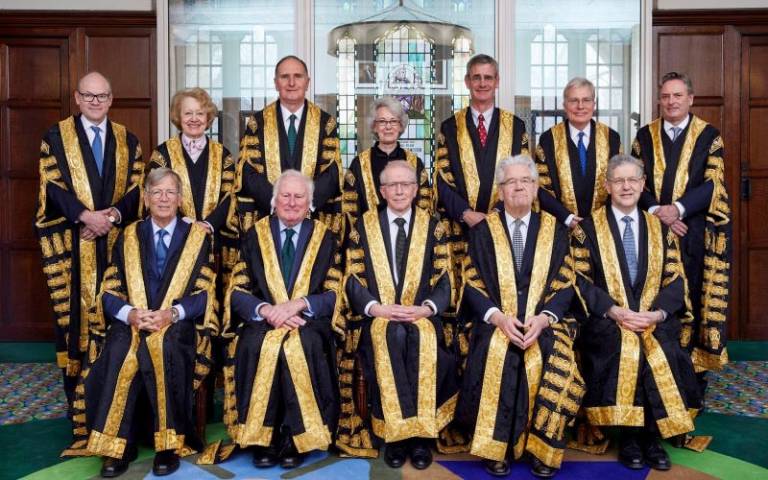
From 2011 to 2014, Robert Hazell led an AHRC-funded project on the Politics of Judicial Independence, with Professor Kate Malleson (QMUL), Graham Gee (Sheffield) and Patrick O’Brien (Oxford Brookes). Their book, The Politics of Judicial Independence in the UK’s Changing Constitution concluded that judicial independence does not require judges to be insulated from politics; rather the reverse – judicial independence is a political achievement, defined and protected through interactions between judges and politicians. The greatest threat to judicial independence in future may lie not from politicians actively seeking to undermine the courts, but rather from their increasing disengagement from the justice system and the judiciary.
14. Starting a new chapter
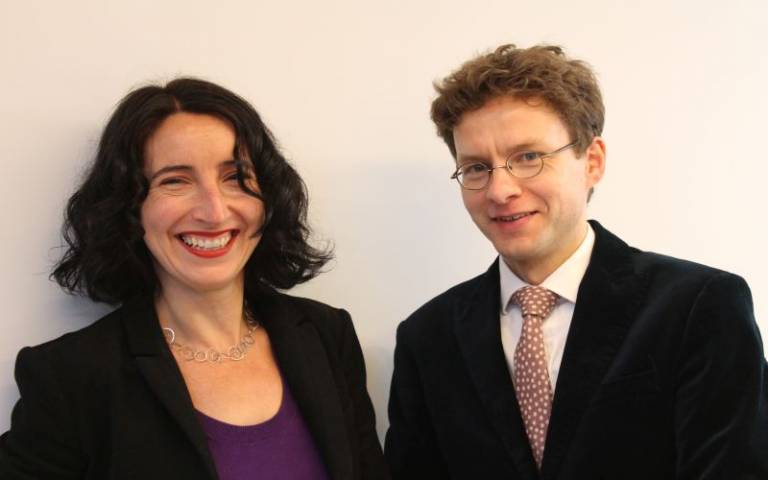
Meg Russell gave her inaugural lecture as a Professor in March 2015, entitled ‘Politics, Academia and the Real World’, arguing for closer engagement between political practitioners and academics. That autumn she took over from Robert Hazell as Director of the Constitution Unit, while Alan Renwick joined the Unit and succeeded her as Deputy Director.
15. Celebrating 20 years
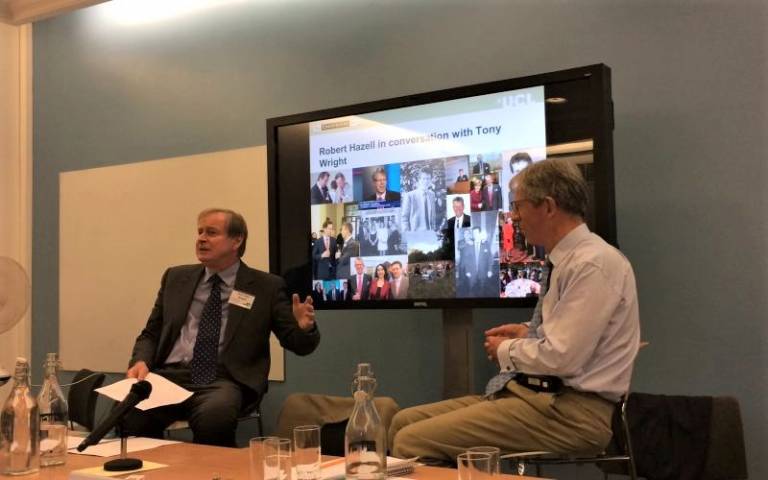
In June 2015 the Unit celebrated its 20th anniversary, with a lively conference looking back at its impact in areas including devolution, parliamentary reform, elections and the courts. Speakers included constitutional expert Professor Vernon Bogdanor of King’s College London, former Chair of the Committee on Reform of the House of Commons Tony Wright, Electoral Commission Chair Jenny Watson, and former Court of Appeal judge Sir Stephen Sedley, plus Constitution Unit researchers past and present. Several of the contributions later appeared in a special series of posts on the Unit’s blog.
16. Brexit: contemplating the possibility of Leave
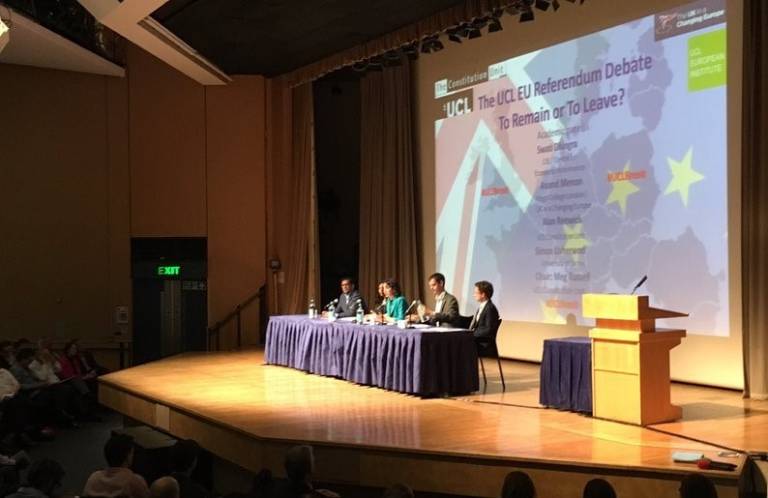
In early 2016 the Unit co-hosted a series of public events with the UCL European Institute and the UK in a Changing Europe, looking ahead at the likely effects of Brexit. At that time very few others were contemplating the possibility of a win for Leave, and these events were among the first to point out key issues such as the effects on the Northern Ireland border and on pressure for Scottish independence. Videos and accompanying briefing papers for each event remain available.
17. Tackling misinformation in the 2016 referendum campaign
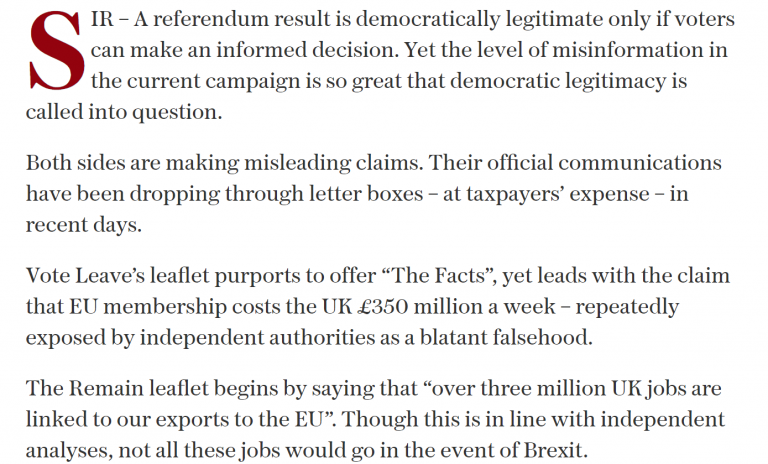
A week before the EU referendum, Unit researchers coordinated a letter to The Telegraph signed by over 250 academics that criticised the misinformation being propagated on both sides of the campaign. It said, ‘A referendum result is democratically legitimate only if voters can make an informed decision. Yet, the level of misinformation in the current campaign is so great that democratic legitimacy is called into question.’
18. Our most-read blogpost
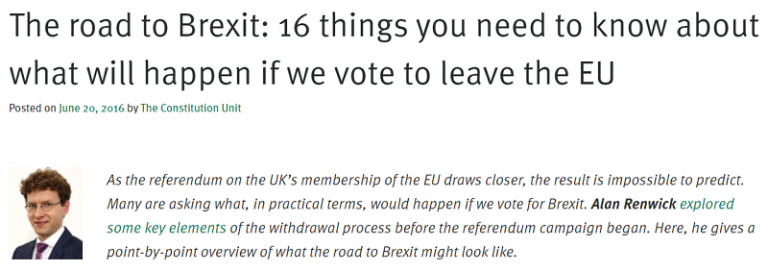
With three days to go before the referendum, Alan Renwick published a post on the Unit’s blog entitled ‘The road to Brexit: 16 things you need to know about what will happen if we vote to leave the EU’. This quickly became the Unit’s biggest-hitting ever post, accessed well over 100,000 times – again answering questions that few others were considering at the time.
19. Uncovering the dynamics within Westminster’s legislative process
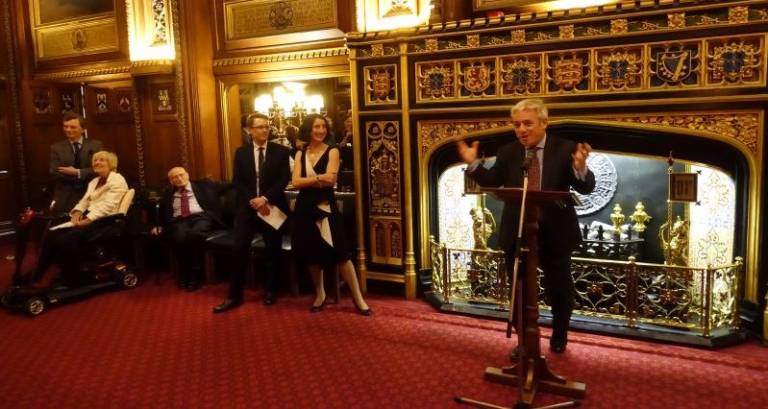
In 2017, Meg Russell and Daniel Gover’s book Legislation at Westminster was published by Oxford University Press, and launched at an event in the Speaker’s apartments in the House of Commons. Described by reviewers as ‘outstanding’, ‘revealing’ and ‘elegant and important’, it was the culmination of the largest study of the UK legislative process for 40 years, funded by the Nuffield Foundation. The book emphasised the centrality of informal and hidden political influence behind the scenes at Westminster.
20. The first UK-wide citizens’ assembly
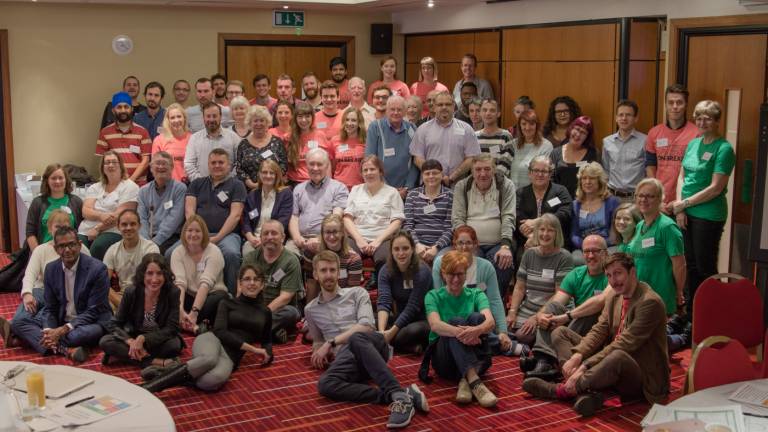
The Unit ran the first ever UK-wide citizens’ assembly in autumn 2017, funded by the ESRC as part of the UK in a Changing Europe initiative. Comprising 60 members, the Citizens’ Assembly on Brexit met in Manchester over two weekends to examine post-Brexit trade and migration policies. Its recommendations were presented at special events in Westminster and Edinburgh and at hearings with three parliamentary select committees. Since then, the use of citizens’ assemblies has taken off, with the UK parliament, Welsh Parliament, and Scottish government all convening such bodies.
21. Charting a new approach to referendums
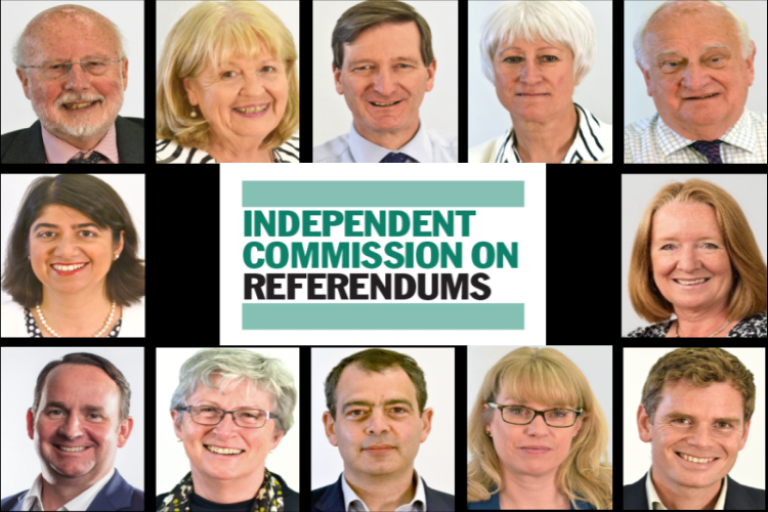
In 2017, the Unit established the Independent Commission on Referendums to review the role of referendums in British democracy and how rules and practice could be improved. The Commission – comprising 12 senior figures from politics, the media, and elsewhere – unanimously agreed a report proposing wide-ranging changes. The work was widely praised in the House of Lords and the subject of a special evidence session with the Commons Public Administration and Constitutional Affairs Committee. Alan Renwick, the Commission’s Research Director, was later appointed as advisor to a Council of Europe inquiry into referendum regulation, which adopted many of the Commission’s conclusions. His evidence also strongly influenced legislation on referendums passed by the Scottish Parliament in 2019.
22. Informing the debate around a second Brexit referendum
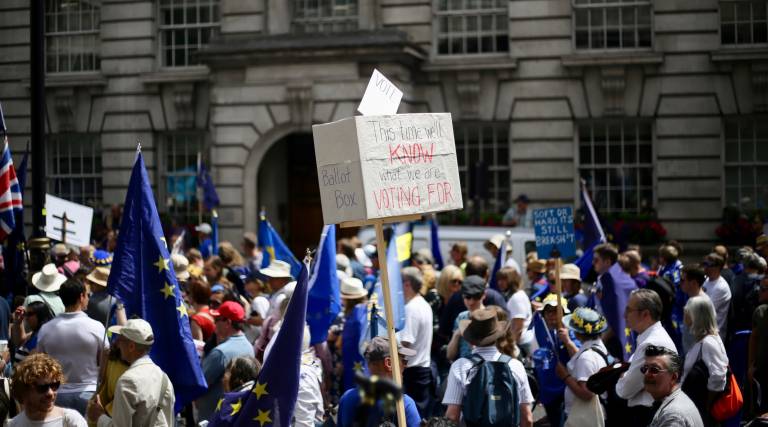
During the prolonged impasse over Brexit in 2018 and 2019, the Unit published two reports on the mechanics of holding another referendum. Without taking a view on whether such a referendum should take place, these assessed how it might come about and what form it could take. They became the go-to guides during a period of intense debate, cited over 100 times in the media. Most influential was the analysis that holding a referendum would take a minimum of five months.
23. Doing Democracy Better
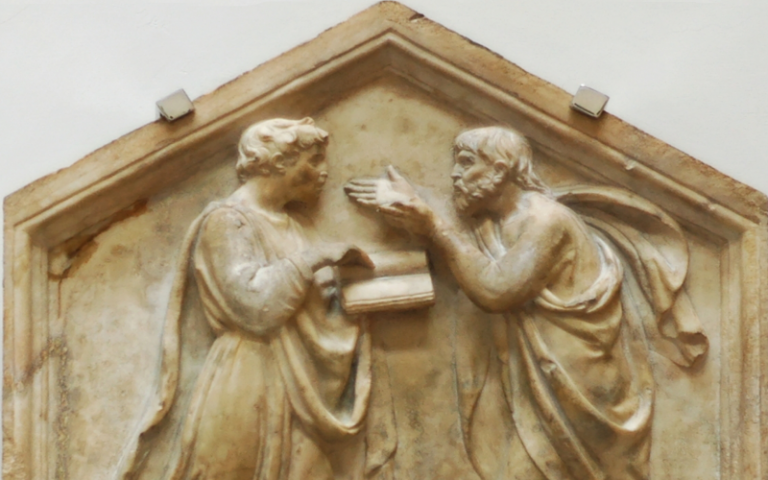
In 2019, Alan Renwick and Michela Palese published a major report, Doing Democracy Better: How Can Information and Discourse in Election and Referendum Campaigns in the UK Be Improved?, funded by the McDougall Trust. Through detailed analysis of practice in eight countries, this recommended a new approach to information provision in elections and referendums, so that voters can find the answers they want. This research underpinned much of the work of the Independent Commission on Referendums (see item 21), and the proposals were explored in a lively Unit seminar.
24. Contributing to debates over parliament’s role in Brexit
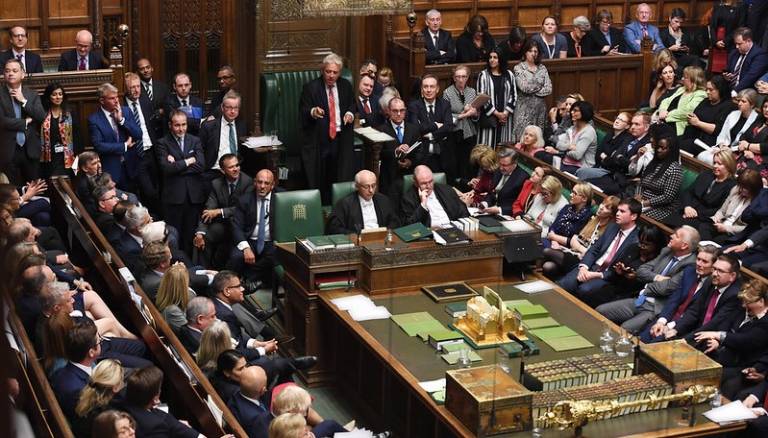
In 2019, Unit researchers made significant contributions to the public debate over parliament’s role in Brexit, including over the attempted five-week prorogation. In early September, Meg Russell headed a letter to The Times from 21 senior experts, arguing that the prorogation – which was later overturned by the Supreme Court – was constitutionally improper (arguments expanded in a Unit blog post on the same day). She also made numerous media appearances, including on the World at One and News at Ten around the prorogation and subsequently, including live commentary on News at Ten when Boris Johnson’s government was defeated over the ‘Benn Bill’. She later published a detailed analysis of what caused the unprecedented conflict between government and parliament over Brexit. This all forms part of her role as a Senior Fellow with the ESRC-funded UK in a Changing Europe, which continues until 2022.
25. Working out the process of a referendum on Northern Ireland’s constitutional status

The Unit established the Working Group on Unification Referendums on the Island of Ireland in autumn 2019, with funding from the British Academy and Joseph Rowntree Charitable Trust. A referendum on Northern Ireland’s constitutional future might be required in the coming years, yet very little has been worked out as to how this would be done – despite the dangers that an ill-designed process would bring. While taking no view on whether a referendum should happen, the Working Group is seeking to fill this gap. Its 13 members – political and legal scholars from Belfast and Dublin as well as the Constitution Unit – are spending the year consulting and deliberating. They aim to publish an interim report in the autumn and a final report early next year.
There are many other things that we could have chosen to illustrate the Unit's contributions across the years. We continue to be active in many policy areas, contributing to contemporary debates through our research, publications, events, blog, our Newsletter Monitor, and through public appearances and social media.
To mark our 25 years we have launched a special fundraising initiative, encouraging supporters to make donations incorporating the figures 2 and 5. If you value our work, and would like to contribute to its future continuation, please consider making a one-off or regular donation. Contributions are essential to supporting our public-facing work. Find out more on our donations page.
Sign up to our mailing lists, for news of events and publications, or to our blog, here.
 Close
Close



